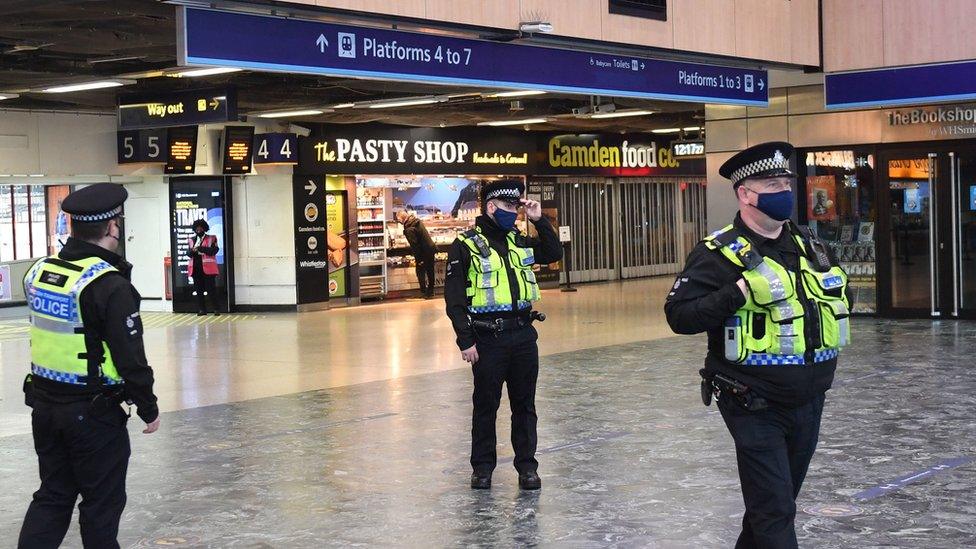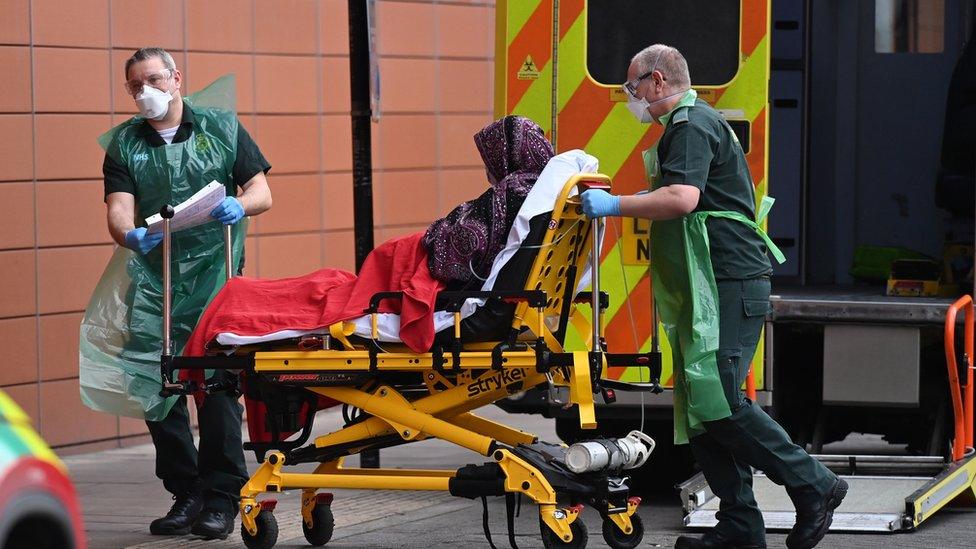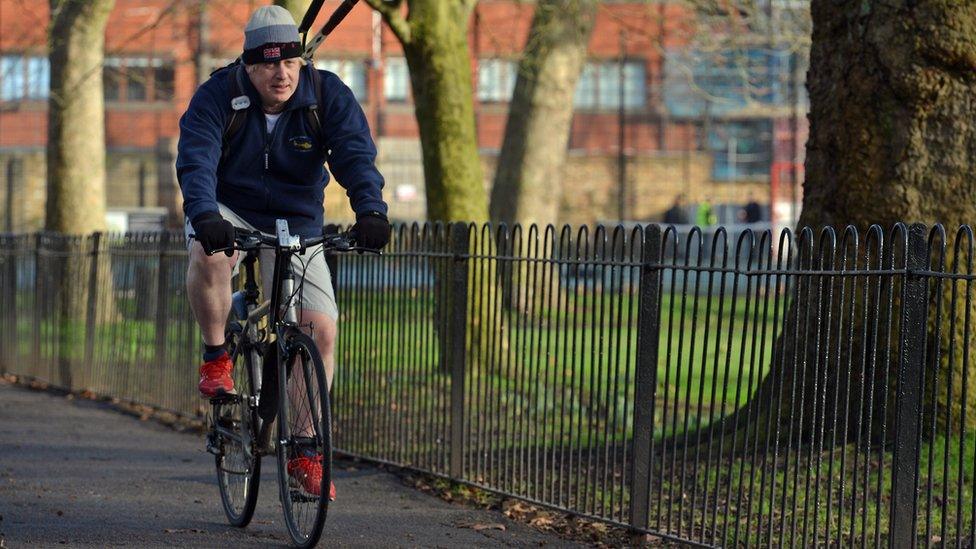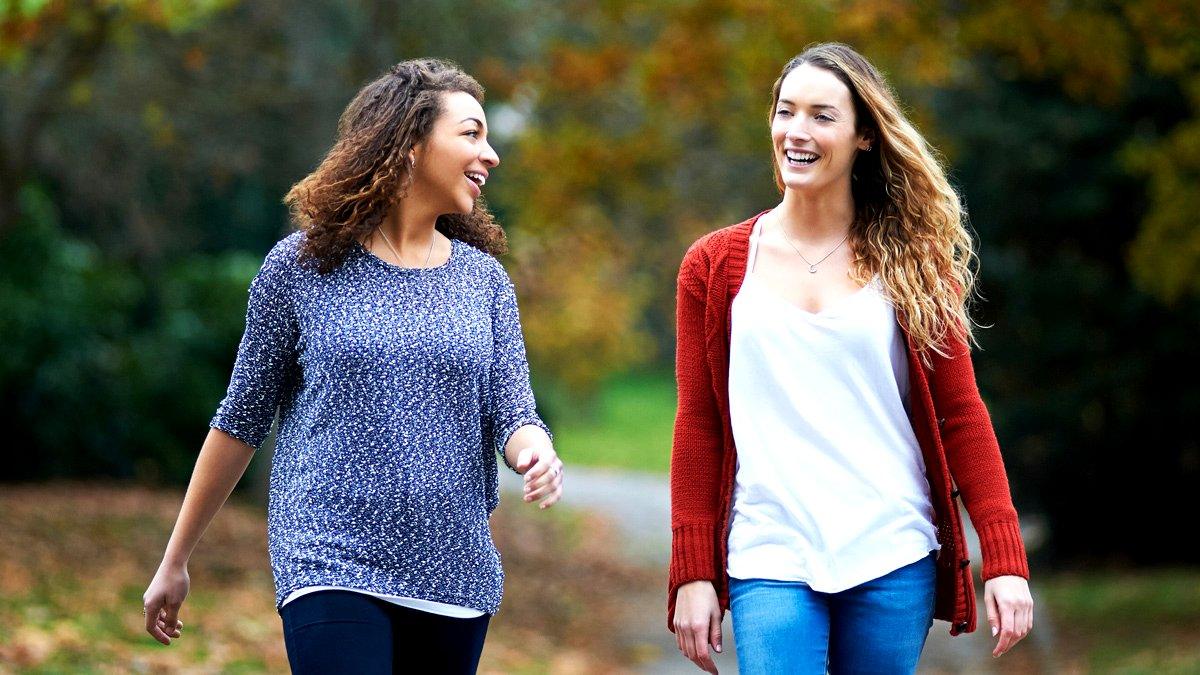Covid: What next for restrictions as hospital cases rise?
- Published

What is the next move?
The disease is still spreading. There are more people in hospital with Covid-19 in the UK than at any other point in the pandemic.
Prof Chris Whitty, England's chief medical officer, hit the airwaves on Monday morning to tell us it's "everyone's problem".
And a possible further increase in the numbers from those get-togethers that did take place over Christmas is yet to filter through.
It is cheering, and crucial, to see the elderly and vulnerable attending vaccine super-centres in huge numbers for their injections.
But there is no getting away from it: at this moment, the coronavirus situation seems pretty dire. And there is real concern in government that the public, this time round, is just not paying attention to the rules as closely as they did back in the spring.
What is the government's answer? It is not, at least not yet, despite calls from the opposition, another big clampdown.
It might not feel like it, but it is only seven days since Boris Johnson took what used to be the rare step of making a national address, live on primetime TV, telling us, across the UK, once more to "stay at home".
There is hardly any political appetite to go even further.
As one senior minister said today: "We have gone as far as we possibly can in terms of shutting things down".
The prime minister was reluctant to go this far, only moving back to a lockdown in England when the evidence put forward by the government's top medics got worse, and worse and worse.
Options for restrictions
There are in fact even more limits that ministers, not just in Westminster but in Edinburgh, Cardiff and Belfast too, could introduce.
Schools could be forcibly closed to all pupils. Nurseries could shut.
Government sources say the nurseries policy isn't going to change. Number 10 firmly denies they would ever take such a drastic step on schools which have always been open to key workers' children and it is hard to imagine that ever happening.
In extremis though there are measures that could be taken - in theory the government does not want to do any of this, but in practice there are other potential steps.
Building sites could be made to lock their gates. Factories where machines are still whirring because they are operating under Covid guidelines could be made to pause.
England, Scotland and Northern Ireland could follow Wales and ban people from seeing anyone they don't live with even outdoors.
Playgrounds, launderettes and chiropractors, could, along with many others on the list of premises allowed to stay open, have to shut up shop after all.
But while ministers have talked about squeezing the advice for takeaways to try to prevent big queues gathering at popular places, encouraged the supermarkets to make sure they are doing as much as they can to be safe, and even discussed the prospect of asking for masks to be worn outdoors, there is no expectation, at least at the start of this week, that a more extensive clampdown is coming from Westminster.
Although, it's worth noting that the Scottish cabinet will discuss restrictions again on Tuesday.
On Monday Matt Hancock ruled out getting rid of support bubbles.
One reason for the reluctance to go much further is that every step that affects a business affects jobs and livelihoods too.
The chancellor told MPs on Monday that 800,000 people have lost their jobs since February, admitting the economy will get worse before it gets better.
So trying to preserve activity that can be done safely matters to the government too.
There's also a question in government circles about whether cranking up different rules bit by bit is really what would help.
Chris Whitty this morning bluntly suggested there was limited value in "tinkering" with the rules, and what is required instead is for all of us to realise how grave the situation really is.
Instead of worrying about whether we are allowed to sit on a park bench at all, (and yes, this has been a lively conversation in Westminster today) , perhaps we should be asking ourselves whether we really need to be out at all.

The NHS has been under huge pressure dealing with a surge in Covid cases this winter.
But when what happens next will be in large part shaped by our behaviour as individuals, working out the dos and don'ts can get sticky fast.
Two women who hit the headlines for driving five miles to go for a snowy walk with a takeaway cuppa had their fines withdrawn today, just as the prime minister caused a stir when a newspaper revealed he'd gone seven miles to the other side of London for a cycle in the Olympic Park.
You might be a reader who feels, 'so what?'. In both cases they were exercising outside, within the law, so who cares?
But you might feel when the firm instruction is to stay at home, and stay local, that is pushing the rules.
(For what it's worth, the government's guidance is to "stay local" for exercise. There is no mileage limit, but the definition in the official advice says people should "stay in the village, town, or part of the city where you live". And there aren't many inhabitants of SW1 who would see Stratford in East London as local to them, or East Enders who would see Downing Street as round the corner.)
For now though, with grimmer and grimmer medics' warnings ringing in our ears, and reminders about enforcement from the police coming too, ministers seem resolved to encourage the public to comply rather than crack down further.
But it is however, only a week since the lockdown the prime minister had so hoped to avoid returned. By now, it's not surprising, Boris Johnson would never quite rule anything out.

P.S. In all the gloom, the cheerier news is that the vaccination programme across the UK is certainly getting going, with 2.3 million people having had their first jab.
The number of people getting vaccinated has been added to the list of statistics that the government publishes every day, external. The targets the government has set are tough, but the numbers so far, are growing fast.
Related topics
- Published11 January 2021

- Published12 January 2021

